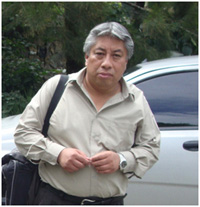The Q’eqchi’ Association - Xch’ool Ixim, in its effort to improve the quality of education in the regions of the Cobán district, believes it essential to initiate a process for the development of a joint project of strengthening and updating teaching so as to foster an intercultural, bilingual education in the classroom. Through a dedicated team of trainers, this program has assisted approximately 900 teachers and 300 schools in Alta Verapaz.
The goal of this project is to improve the pedagogical practices in the classroom and strengthen the teachers’ theoretical and practical knowledge so that they can better assist their students in realizing their full potential. To do so, it draws on the experience of Alta Verapaz’s Board of Education in bilingual education, and also on the teaching methods implemented by Q’eqchi’ Xch’ool Ixim in the approach to language and culture. This joint effort responds to the policies of the Ministry of Education, and to the collective agreement signed by the National Assembly of the Magisterium, San Carlos University of Guatemala, and the Ministry of Education.
The goal of this project is to improve the pedagogical practices in the classroom and strengthen the teachers’ theoretical and practical knowledge so that they can better assist their students in realizing their full potential. To do so, it draws on the experience of Alta Verapaz’s Board of Education in bilingual education, and also on the teaching methods implemented by Q’eqchi’ Xch’ool Ixim in the approach to language and culture. This joint effort responds to the policies of the Ministry of Education, and to the collective agreement signed by the National Assembly of the Magisterium, San Carlos University of Guatemala, and the Ministry of Education.
General Objective
Offer a pedagogical proposal of quality that is appropriate for an intercultural, bilingual education for the linguistic communities in the region.
Specific Objectives
1. Design and implement a plan of teacher training and trainers in the application of educational, theoretical, and methodological procedures that includes the social and cultural context of each educational community.
2. Develop and apply bilingual educational materials relevant to the realities and needs of the educational process in the communities.
3. Carry out the technical and pedagogical support necessary for the application of intercultural and bilingual education in the classroom, based on the received training.
4. Implement a plan for the community participation and advocacy at the regional level.

















